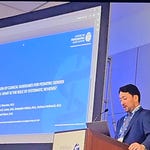Stanford physician and economist Jay Bhattacharya has been nominated by President Donald Trump to lead the National Institutes of Health during his second administration.
Dr. Bhattacharya has been quite controversial, in particular because he was one of the lead authors of the Great Barrington Declaration. This statement, which he and others issued early in the COVID pandemic, argued that it would be better not to impose major lockdowns and restrictions on younger people, because they were at lower risk of sickness and death from COVID. For the nation’s youth, the costs of such restrictions were, in theory, too high and the benefits too few. Instead, the declaration’s authors posited that society should focus restrictive risk-mitigation efforts only on the older people and others with comorbidities who were at higher risk in the face of the virus.
Dr. Bhattacharya in particular was subsequently widely pilloried by much of the nation’s public health intelligentsia. But as The New York Times just reported, his argument about how the nation should have handled COVID has been getting a second look of late. This as society has been conducting a post-mortem on how lockdowns and school closures, for example, led to learning loss and mental-health problems in children.
I interviewed Dr. Bhattacharya at length in the spring and have included the vast majority of the tape in this podcast. Our conversation was for an article I published here on Substack (see below) on the vested interest that certain special interest groups have in fomenting fear about their particular area concern. I was interested in examining how such groups respond when, for example, the public-health problem they advocate for improves dramatically, or when new research indicates the problem was never as dire as has long been thought. Some organizations, primed to exist in perpetuity, are none too pleased by such a scenario.
Dr. Bhattacharya and I had a wide-ranging discussion, covering Covid, the history of breast cancer research, the polio vaccine clinical trial, monkeypox, pediatric gender medicine (he was quite critical of the field, making me wonder how he might impact it going forward), our Twitter blocking policies, and my own battle with cancer.
And we discussed how each of us has been treated in the court of public opinion after we’ve come out strongly with what at least in certain circles have been wildly unpopular positions on public health that we nevertheless have felt certain were backed by solid science.
Why Special-Interest Groups Are Motivated to Foment Fear
Some published studies detonate into a mushroom cloud. Others bloom with good news.
I am an independent journalist, specializing in science and health care coverage. I contribute to The New York Times, The Guardian, NBC News and The New York Sun. I have also written for the Washington Post, The Atlantic and The Nation. Follow me on Twitter: @benryanwriter and Bluesky: @benryanwriter.bsky.social. Visit my website: benryan.net
















Share this post